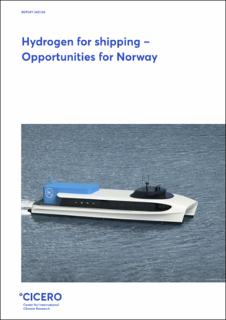Hydrogen for shipping – Opportunities for Norway
Report
Published version
Permanent lenke
https://hdl.handle.net/11250/2755909Utgivelsesdato
2021-05Metadata
Vis full innførselSamlinger
- CICERO Reports [210]
Sammendrag
Physical and economic properties of hydrogen mean that its potential as shipping fuel with current technologies is limited to some shipping segments, since alternative fuels are better suited for other applications. An additional challenge for hydrogen is the large investments needed in infrastructure for production, transport, and bunker, as well as improved engine systems for ships. The most promising potential for hydrogen is for short to medium shipping distances, where the capacity of batteries is insufficient, whereas natural gas and biofuels could be more competitive for longer distance operations due to higher energy density by volume.
Due to energy losses at each step along the hydrogen chain (from production, through processing, transportation and using hydrogen) as compared to using natural gas or electricity/batteries directly for running ships, hydrogen will be relatively more competitive than alternative fuels when:
a) Batteries have insufficient power storage capacity, and with infrequent possibilities to re-charge;
b) A sufficient tax on CO2 emissions makes the value of capturing CO2 from blue hydrogen production high enough to cover the CCS cost. With a high cost on CO2 emissions, natural gas (LPG or LNG) for shipping becomes less competitive;
c) Biofuels (HVO or LBG) are less competitive due to higher cost or technical challenges for a specific ship application; or
d) Using hydrogen production as a battery to store surplus production of renewable power is the best value, due to grid limitations, etc. Due to multiple hydro reservoirs in Norway such storage flexibility is of less importance for Norway than e. g. Germany.
Hydrogen is currently not competitive with traditional maritime fuels and likely also not competitive with some of the alternative fuels for shipping. This means that there is need for stronger incentives through a supportive policy-economic framework, e. g. through public funding of infrastructure, public procurement, or supportive funds. There are good opportunities for Norway-EU collaboration on improving green hydrogen technologies, not the least on hydrogen-fueled shipping. Hydrogen-based shipping means opportunities for a new and internationally competitive industry in Norway given our high competence in marine-related technologies, in particular designing and building advanced ships.

